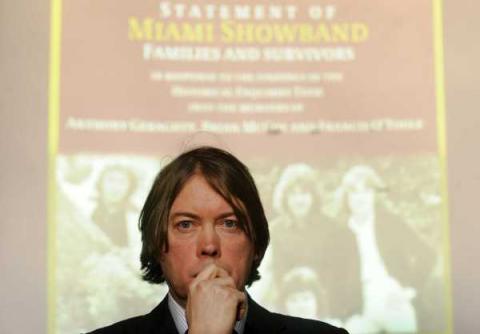Miami showband atrocity puts our woes in perspective

There are press conferences most days in Buswells Hotel across from Leinster House - press conferences of the smaller political parties, of various lobby groups and protest movements. The press conferences are often vacuous and forgettable.
I showed up there last Wednesday morning because Margaret Irwin of Justice for the Forgotten had phoned me. I was not expecting much, except to express solidarity again with the victims of the Dublin and Monaghan bombings of 1974.
At least one other journalist had shown up for the same reason. What transpired was riveting, in part because of the perspective it gave to our current predicaments.
The event was to do with one of the most horrific and unforgettable atrocities of the Troubles, the murders of three members of one of the country's then most famous bands, the Miami Showband, on the morning of Thursday, July 31, 1975.
The atrocity was unforgettable because of the affection throughout Ireland at the time for that band. It was horrific because of the circumstances of that atrocity - circumstances with which we all became familiar because of the entirely fortuitous survival of two of the band members - and because of the evidence of official collusion with those awful murders.
The press conference revealed the results of the North's Historical Enquiries Team investigation into the event. The band was returning to Dublin from a gig in Banbridge and was stopped at what seemed to be an official British army checkpoint on the road to Newry.
At the checkpoint were members of loyalist paramilitary organisation the Ulster Volunteer Force (UVF), among whom were at least two then serving members of a regiment of the British army, the Ulster Defence Regiment (all dressed in UDR uniforms), led by someone with a posh English accent.
A former British army intelligence officer, Fred Holroyd, said later that this person was another British army intelligence office, Captain Robert Nairac, who was later murdered by the IRA. His body has never been found.
The 'soldiers' ordered the band members out of their Volkswagen van and took their names and addresses. The 'soldiers' went to the back of the van, and there was then an explosion which killed two members of the UVF gang, Harris Boyle and Wesley Somerville.
It injured the five members of the showband, throwing one of them, Des McAlea, into a ditch. The surviving members of the UVF band then opened fire on the other four showband members, killing Tony Geraghty, Brian McCoy and Fran O'Toole, and wounding Stephen Travers, who survived, along with Des McAlea.
The plan seems to have been to plant a bomb on the van, which would later explode on the journey to Dublin, creating the impression that the band was ferrying explosives for the IRA.
Two members of the UDR, Thomas Crozier and James McDowell, were convicted of the murders, and James Sommerville was convicted later.
Subsequently, it emerged that one of the most notorious UVF killers of that time, Robert Jackson, was also involved. He was arrested early in the inquiry and claimed that two RUC officers had tipped him off that his fingerprints had been found on a silencer attached to a Luger pistol used in the murders.
The Historical Enquiries Team commented that that was "a deeply disturbing matter". Also disturbing is how Jackson was acquitted on a related charge, after his explanation for the fingerprint on the silencer had been rejected by the court.
A further disturbing finding was a document which surfaced in the course of the enquiries, a declassified memorandum headed 'Subversion in the UDR' dated two years before the Miami murders. This acknowledged that there was widespread collusion with loyalist paramilitaries by members of the UDR. Yet, for years subsequent to the date of this document, British government ministers and officials repeatedly denied there was any such collusion.
Of course, there were worse atrocities, most of them perpetrated by the IRA, but the vivid recall last Wednesday morning of the Miami Showband atrocity was chilling all over again and, as some of us journalists remarked to each other afterwards, our current predicaments seem almost trivial by comparison.
But outside the context of that horror, with which we lived for over 20 years, there are reasons for alarm about current events.
That the 'leaders' of Europe would propose an international agreement, outside the ambit of the EU, that would presume to decide how the power of an institution of the EU the Court of Justice should be extended, is disconcerting.
That they should be tricking around with treaties at all at a time of the imminent conflagration of the eurozone is also startling.
And that they are planning on an arrangement which would tie us into an ideology, neoliberalism, that has done such terrible damage to the lives of millions in the developed world - and maybe billions otherwise - is a subversion of national democracies (via the proposal of prior supervision of budgets and oversight of economic policy).
Furthermore, that they should be tricking around with treaties at all at a time of the imminent conflagration of the eurozone is also startling.
Also disturbing is that one of our ministers, Michael Noonan, should now be preparing the ground for a constitutional change yet again on the basis of a falsehood - the claim that a treaty not yet drafted would exclude us from the eurozone if we were to reject it.
But anything may be preferable to the 'good old days' of horror and slaughter.
